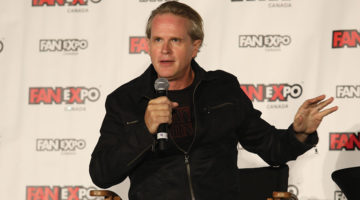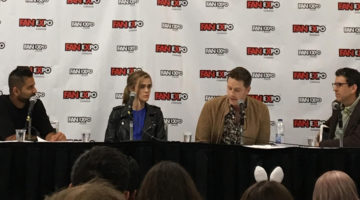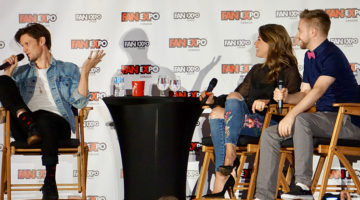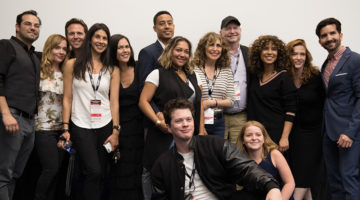Fan Expo 2012: Stan Lee Panel
As I waited for Stan Lee to appear in Hall G at the Metro Toronto Convention Centre, I was curious about the show that was to come. I was equally curious to know why the music playing in the hall sounded like a collaboration between Enya and Carlos Santana, but that’s neither here nor there, really. The crowd seemed excited to see Lee appear, so much so that I witnessed more than one person literally sprint to the best available seat upon being let into the hall. There was nervous chatter amongst patrons who didn’t know each other; a gentleman sitting in front of me and wearing a Tilley hat was monologuing about his love of Inuit literature to a polite, if uninterested, younger female. People were explaining to each other where they had traveled from to be here, or what the best cosplay they had seen to that point in the day. Iron Mans, and Spider-Mans, and adorable five-year-old Thors patrolled the floor, trying to find the best place to set up to take a picture of the proceedings. Then Stan Lee walked in.
As he was introduced to a crowd shouting “EXCELSIOR!” in unison, it became evident that Stan Lee knew what he was doing here, as to say he knows how to work a crowd is a mild understatement. About half of the audience gave his arrival a standing ovation, and Lee responded by being immediately complimentary to the audience. His responses to the questions asked of him followed a similar formula, in that Lee would immediately make fun of himself in a way that fit the question, before complimenting himself or his work, and then actually answering the question in a joking manner. One got the idea that all of these answers were rehearsed and practiced, albeit by way of simply doing so many of these Q&As over the years. None of the jokes felt truly off the cuff, and one even sounded wildly outdated, in a “grandpa doesn’t know that’s kind of a homophobic thing to say these days” sort of way. But the audience seemed to get exactly what they wanted. I would guess that, over the course of the roughly 45-minute session, Stan Lee was smiling broadly for 44 of those minutes, and the audience’s facial expressions seemed to mirror that
As far as the actual questions asked of Lee, the majority of them were related to the films Marvel is now famous for. Lee was asked about his cameos, to which he provided a theory as to how The Avengers grossed so much this summer.
“Can I tell you why The Avengers made so much money? […] They made my cameo very brief and put it at the very end,” before saying that people would miss it on their initial viewing, and buy another ticket to make sure they saw it. And while that reads as unfunny on paper, to hear Lee say it seemed to throw the majority of the audience into fits of laughter. He informed the crowd to watch out for his cameo in next summer’s Iron Man 3, and also implored the audience to write in to the Academy of Motion Picture Arts and Sciences to create an award for Best Cameo. (Contrary to Lee’s hopes, no petitions to Hawk Koch have appeared online in the days following this request.)
Throughout the session, Lee seemed a bit cockier than one might expect for a comic book writer, although Lee probably belongs in his own world on the comic writer chart. His self-deprecating jokes were always followed by a sentence that was a bit self-aggrandizing, which made Lee seem a bit less likeable, but probably didn’t make him any less correct. To the public, he is the face of comic books, and likely the only comic book writer anybody in the average person could name. Put simply, your mom probably knows who Stan Lee is.
Stan Lee’s history in the comics business is a little sketchy, and there have long been hypotheses that Lee is more of a self-promoter than he is a writer. While Lee is credited as co-creator of key Marvel characters like Spider-Man, the Fantastic Four, Iron Man, and Thor, one doesn’t have to look far to find a comic artist that feels wronged by Lee. Perhaps most famously Jack Kirby, Lee’s co-creator on the Fantastic Four, X-Men, and the Hulk, took great umbrage in how Lee seems to be remembered as the sole creator, and how Lee appears to reap the greatest financial rewards from their work. Kirby did not feel his contributions to the stories of the books he wrote were adequately credited, which seems to be a common complaint by artists working under the Marvel Method of writing Stan Lee used in the 1960s. This method of writing involved a writer (in this case Stan Lee) giving the artist (Kirby) jot points for the beginning, middle, and end of a story, and the artist would then panel out the rest of the story however they saw fit, before handing it back to the writer to pen the dialogue. This was partially done because of Lee’s full plate of comics to preside over, but the mild controversy over Lee taking more credit than he may deserve remains.
Perhaps that comes back to his own personality, as Lee seems more adept as a salesman than one would expect the average comic writer to be. And contracts in those days were viewed as loose guidelines; many deals were scribed on napkins, which tend to not hold up well in court. Promises were made, and later denied, as the publishing companies involved in comic book production treated them as little more than rags to sell for profit. Lee’s role as a promoter helped this, and to think Marvel could have achieved the same amount of notoriety without this seems naïve. His openness to see the comic book industry become just that, an industry, set him apart from many artists, and his ability to sell these products put him on the forefront of that industry.
Stan Lee has profited immensely for his co-creations, both financially and as a public figure. The ethics of how artists like Jack Kirby or Steve Ditko have been remembered because of this are debatable, but the truth is any growing art form will always leave some people behind. One doesn’t have to look hard for similar figures in the growth of film, and rock music as well. If you care about comics, you have to like Stan Lee, if only because he has helped publicly validate something you care about. At the Q&A, one of Lee’s last (and likely apocryphal) anecdotes was about how when he was younger, he would introduce himself to people at parties as ‘a writer,’ and then excuse himself from the conversation before anybody could ask what it is he writes. Lee himself was embarrassed of working in the comics industry, as they were viewed as worthless trash by the common person. Now, however, this has changed, and it’s all Lee’s doing. When somebody in the audience at Fan Expo mentioned to Lee that she was getting a doctorate in comic books studies, nobody was surprised, even though this would have been unthinkable when Lee began his career. Simply put, comic books are viewed as an art form now, and a large part of that has to do with Stan Lee’s work. He may be more figurehead than writer, but sometimes figureheads can accomplish some amazing things.
As Lee continued his story, he explained what he sees happen at parties he attends these days, where people say things like “Excuse me President Obama, I’ve gotta go talk to Stan Lee.” Like Lee himself, this story is more fiction than it is truth, but that it’s conceivable for a comic book writer to be in the same room as the President of the United States is mostly Lee’s doing. If nothing else, he validated an art form many people passionately care about, and that’s worth something.
(So as to not Jack Kirby him, special thanks are due to Travis Taylor for his contributions here.)







